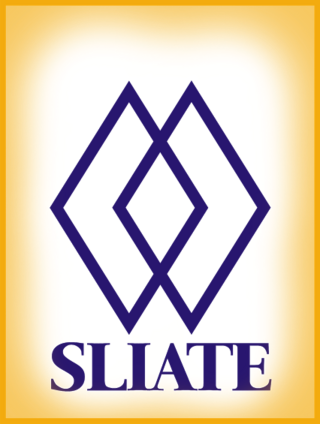
A college is an educational institution or a constituent part of one. A college may be a degree-awarding tertiary educational institution, a part of a collegiate or federal university, an institution offering vocational education, or a secondary school.

A community college is a type of educational institution. The term can have different meanings in different countries: many community colleges have an "open enrollment" for students who have graduated from high school. The term usually refers to a higher educational institution that provides workforce education and college transfer academic programs. Some institutions maintain athletic teams and dormitories similar to their university counterparts.

Tertiary education, also referred to as third-level, third-stage or post-secondary education, is the educational level following the completion of secondary education. The World Bank, for example, defines tertiary education as including universities as well as trade schools and colleges. Higher education is taken to include undergraduate and postgraduate education, while vocational education beyond secondary education is known as further education in the United Kingdom, or included under the category of continuing education in the United States.
An associate degree is an undergraduate degree awarded after a course of post-secondary study lasting two to three years. It is a level of qualification above a high school diploma, GED, or matriculation, and below a bachelor's degree.

Education in Canada is for the most part provided publicly, and is funded and overseen by provincial, territorial and local governments. Education is within provincial jurisdiction and the curriculum is overseen by the province. Education in Canada is generally divided into primary education, followed by secondary education and post-secondary. Within the provinces under the ministry of education, there are district school boards administering the educational programs.
Education in the United Kingdom is a devolved matter with each of the countries of the United Kingdom having separate systems under separate governments. The UK Government is responsible for England, whilst the Scottish Government, the Welsh Government and the Northern Ireland Executive are responsible for Scotland, Wales and Northern Ireland, respectively.
Higher education in Mauritius includes colleges, universities and other technical institutions. Public university education has been free to students since 2019. The sector is managed by the Higher Education Commission (HEC) which has the responsibility for allocating public funds, and fostering, planning and coordinating the development of post-secondary education and training. Formerly the Tertiary Education Commission, in 2020 it was reformed into the HEC and a separate Quality Assurance Authority (QAA) for auditing of qualifications.
An institute of technology is an institution of tertiary education that specializes in engineering, technology, applied science, and natural sciences.

The Australian College of Theology (ACT) is an Australian higher education provider based in Sydney, New South Wales. The college delivers awards in ministry and theology and was one of the first Australian non-university providers to offer an accredited bachelor's degree and a research doctorate. It is now one of two major consortia of theological colleges in Australia, alongside the University of Divinity. Over 22,000 people have graduated since the foundation of the college. On 7 October 2022 it was granted university college status by the Tertiary Education Quality and Standards Agency.

Midlands State University is a government owned university in Zimbabwe. The university has 9 faculties offering a wide variety of courses and many specialist programmes. The university is accredited through the National Council for Higher Education, under the Ministry of Higher and Tertiary Education of Zimbabwe.

Bridgend College is a further education college based in Bridgend, Wales. Founded in 1928 as the Bridgend Mining and Technical Institute, the college today has four campuses in Bridgend, Pencoed, Queens Road and Maesteg.

Education in Western Australia consists of public and private schools in the state of Western Australia, including public and private universities and TAFE colleges. Public school education is supervised by the Department of Education, which forms part of the Government of Western Australia. The School Curriculum and Standards Authority is an independent statutory authority responsible for developing a curriculum and associated standards in all schools, and for ensuring standards of student achievement, and for the assessment and certification according to those standards.
West Herts College is a college for further education in Watford, Hertfordshire, United Kingdom. The college has campuses in Watford, Hemel Hempstead and Kings Langley. As of 2017 the college has 5,900 students on study programmes or apprenticeships.

Bridgwater and Taunton College is a further education college based in the heart of Somerset, England, with main centres in Bridgwater, Taunton and Cannington. It educates approximately 3000 students between the ages of 16–18 in academic and vocational programmes in addition to several thousand part-time or mature students. The college was founded in 1973, although the history of its predecessor institutions dates to 1891.

Education in Malawi stresses academic preparation leading to access to secondary school and universities. However, few students go on to high school or university. The dropout rate is also very high particularly among primary school pupils.

St John Rigby College is a sixth form college in the Orrell district of the Metropolitan Borough of Wigan, Greater Manchester situated in a 30-acre (12 ha) estate. As a college for students who intend to proceed into higher education, students are accepted from across the Metropolitan Borough of Wigan and Metropolitan Borough of Bolton areas of Greater Manchester as well as parts of Merseyside and Lancashire.
Yeovil College is a tertiary college for further education and higher education based in Yeovil, Somerset. It maintains a main campus in the town and, at a second site, a Construction Skills Centre. In conjunction with the universities of Bournemouth, the West of England (UWE) and Gloucestershire, the college provides Higher Education, degree-level and professional courses at a third site known as the University Centre Yeovil (UCY). In Shaftesbury, the college runs the North Dorset Skills Centre.
Takoradi Technical University is a public tertiary education institution (university) located in Sekondi-Takoradi, the capital of the Western Region of Ghana. Takoradi Technical University was established as a Government Technical Institute in 1954, and became part of the State Tertiary Education System. Later after the passage of the Polytechnic Law of 1992. It was replaced by Polytechnics Law in 2007. In 2016, the Bill to convert six out of the 10 polytechnics into a fully fledged university received a unanimous approval of Ghanaian legislators.

The Sri Lanka Institute of Advanced Technological Education is a statutory body in Sri Lanka coming under the purview of the Higher Education Ministry and offering Higher National Diploma courses. At present, it manages and supervises eighteen provincial Advanced Technological Institutes throughout the island. The institute is traditionally known for its education in the accountancy and engineering. As per the recommendations of the Committee appointed by Prof. Wiswa Waranapala, Deputy Minister of Higher Education in 1994, the Sri Lanka Institute of Advanced Technical Education (SLIATE) was formed in 1995, under the Sri Lanka Institute of Advanced Technical Education Act No. 29 of 1995. In 2001, the name of the institution was amended as Sri Lanka Institute of Advanced Technological Education (SLIATE).
A high school diploma is a diploma awarded upon graduation of high school. A high school diploma is awarded after completion of courses of studies lasting four years, typically from grade 9 to grade 12. It is the school leaving qualification in the United States and Canada.
















